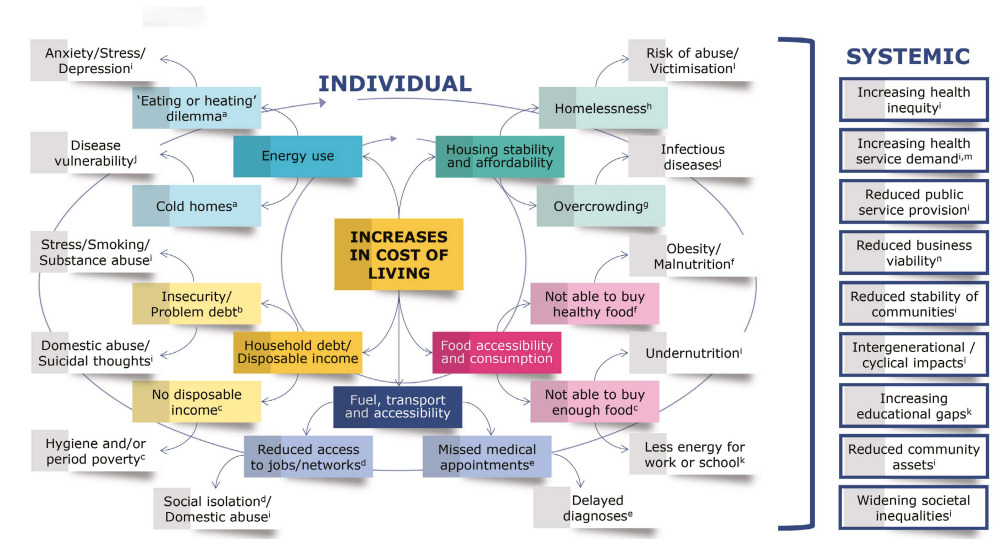High Cost of Living and Your Health

I remember sitting in a governing board meeting in a primary school where we discussed the need to provide free school meals to children from lower income households because they were not being fed properly at home. I listened in disbelief that this was the reality of some of the children who attended that school. I am ashamed to say that at the time, I was so naive and ignorant. You see, the school was situated in what could be classified as a wealthy suburb in the United Kingdom, a G7 country. So, I could not believe that we were discussing this in a school where there seemed to be apparent affluence. I was wrong. That was over eight years ago.
The cost of living crisis has only worsened since- not just in the United Kingdom, but in the world. The cost of everything seems to be going only in one direction- upwards. Wages remain the same, employment is in decline and people are in a lot of debt. A friend who volunteers at food bank near me spoke of the increase in not just the numbers of people who are requesting help, but also in the types of individuals who are seeking support. This includes professionals- teachers, nurses etc. Some people feel shame, others feel guilt, and fear. The toll of the high cost of living on mental health is huge and there are implications for our physical health too such as the increasing challenge of eating healthy, nutritious meals and staying fit through physical activity.
How to look after your health despite the high cost of living
As we can see, the high cost of living has a high impact on our health outcomes. Here are my top tips to looking after your health as the cost of goods and services keep rising:
- Find a community. Sometimes, you may feel like you're all alone with no one to talk to but that's not true. Find an online community, or even better a physical place where you can find help and support for what you need. For example, your local council can help. Call, or email them to ask for help.
- Get in touch with Citizen's advice. There is always some useful information from Citizen's Advice. Just get in touch with them.
- Take a walk in the park, jog or participate in a Youtube exercise video. Instead of joining a gym. This can be liberating and it's free. It also boosts your mood and keeps you active while costing you nothing.
- Get help with financial planning. Start a budget planner and try to spend less than you earn
- Attend an online course and up-skill yourself
- Use a foodbank - find one near you. Try to batch cook fresh meals and store away in the freezer rather than buying ready made foods. This will save lots of money.
- Sleep is important for productivity at work and for your overall health. Try to stop overthinking and get a solid 7-8 hours sleep.
- Use facebook marketplace, ebay and second hand shops more. There are some bargains to be found there.
- Attend your health appointments, visit your pharmacy and get help with prescription charges.
- Find a warm space near you.
A blog by London School of Economics discussed why the high cost of living is a public health issue. Several recommendations were made for policy makers to consider investing in making homes warmer, improving good quality accommodation, supporting fair employment and a good wage, making it easier for people to access screening and vaccination, and ensuring that every child has the best start in life. The infographic below captures the interplay between the cost of living crisis and health from an individual and systemic or organisational perspective.

In times like this, we need all the support we can get from corporate bodies, institutions, debt agencies for example. Employers can play a part in corporate social responsibility by supporting their employees to reduce everyday stressors, build stronger work connections and encourage healthy habits which will improve the overall health and wellbeing of their staff. After all, happy staff must mean more productive teams, less time off work due to illness and increased creativity. As individuals, we can take steps to gain financial education and up-skill to get a new qualification which will, in turn, facilitate better paying jobs are things we could do to improve living circumstances.
What tips do you have for supporting health and wellbeing during the cost of living crisis? Please comment and add to the list!




Comments ()